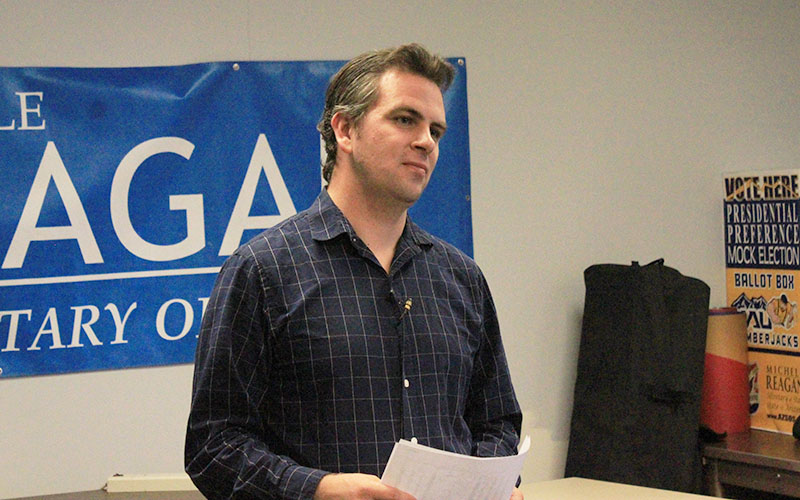
Garrett Archer, director of elections, information systems at the Arizona Secretary of State’s office, speaks about the millennial vote’s impact on the election. (Photo by Kia Murphy/Cronkite News)
PHOENIX – For the first time during an election cycle, the millennial generation surpassed the baby boomers as the largest population of potential voters. Yet as Arizona set a record for early voting this month, millennials accounted for just 11 percent of ballots cast.
An analysis of U.S Census data conducted by the Pew Research Center shows the millennial generation (those born in 1981 through 1997) is the largest population bloc. According to 2015 U.S. Census data, there are an estimated 75.4 million millennials and 74.9 million baby boomers in the United States.
Young Americans have the potential to swing the election, but just more than 206,000 adults ages 18-34 had voted as of November 3, according to the Arizona Secretary of State’s office. The youngest adults, ages 18-24 make up about 74,000 of those voters. The total is less than half the number of early votes cast by those 65 and older – more than 588,000.
Social worker Joanna Marroquin, of Phoenix, is toward the older end of the millennial generation. In past elections, Marroquin identified as a Democrat. Now, in her 30s, she identifies as an independent voter, and she expresses some of the ambivalence described by many millennial voters.
“I believe as a leader, you need to be able to make informed decisions in the community,” she said. “I don’t believe either of these candidates can do that.”
Marroquin of course is referring to Republican nominee Donald Trump and his competitor, Democratic nominee Hillary Clinton.
According to the Arizona Secretary of State’s office, there were approximately 1,219,277 registered voters listed as “other” in November. Those registered as “other” are voters who are registered as an independent or do not identify with a specific party. The “other” voter demographic has spiked since the last presidential election with 1,023,603 voting in November of 2012. As third-party candidates Gary Johnson and Jill Stein have gathered some support, 31,358 voters have registered for the Libertarian party and 6,894 for the Green Party, according to the latest data.
Twenty percent of voters in the “other” category, have been identified as millennials.
“That’s a pretty significant number,” said Garrett Archer, assistant director of elections and information systems at the Arizona Secretary of State’s office.
“That number is going to continue to grow,” he added.
Archer, known as the “AZ Data Guru” on Twitter, said millennials have claimed a portion of the main party statistics as well. They have accounted for 12 percent of the Democratic vote and 7 percent of the Republican vote.
“It’s higher for Democrats. That’s a number that I see all the time, so it doesn’t surprise me in the least,” Archer said.
After millennial favorite Vermont Sen. Bernie Sanders was defeated by Clinton during the Democratic primary, Sanders and Clinton tried to coax young voters to her side. A national survey from April by Harvard University’s Institute of Politics found that three in five young Americans would prefer a Democrat in office rather than a Republican. The survey showed that voters ages 18 to 29 primarily preferred Bernie Sanders to Hillary Clinton. When Sanders was still competing, he had 71 percent of the millennial Democratic vote, while Clinton only had 29 percent.
“Originally, I was a Bernie supporter,” said Marroquin. “I believe [Hillary] would support significant policies that would relate to something a social worker would support, but she wasn’t my first candidate.”
Sanders has been campaigning for Clinton in an effort to draw millennials to the election. Sanders’ last visit to the Valley was Sunday, just two days before the election. The Trump campaign is also focusing on millennial voters with Donald Trump Jr. making two stops to the Valley.
Not all millennials are unenthusiastic about the election.
President of the Arizona State University College Republicans Kevin Calabrese, said he has identified with the Republican Party since his teenage years. Calabrese said he is excited for the election, noting how he thinks the campaign could benefit his age group.
“I think the Trump campaign has a lot to offer for millennials,” said Calabrese.
He cites the job market as a hot topic, saying Trump’s proposal to expand the job market is attractive to young Americans.
“When you graduate, the last thing you want is to have to pay off your debt and have no source of income.”
In 2008, then-Sen. Barack Obama energized young voters, who turned out at a record 50 percent for 18- to 29-year-olds. That support dropped for President Obama to a 40 percent turnout in 2012. Archer noted that much like the generations before them, millennials will get older, and voting trends will change.
“As the millennial demographic kind of categorizes itself up into the next age group, people that are millennials will start voting at a higher rate,” he adds, “That’s when the politicians will start to really pay attention to this age group.”